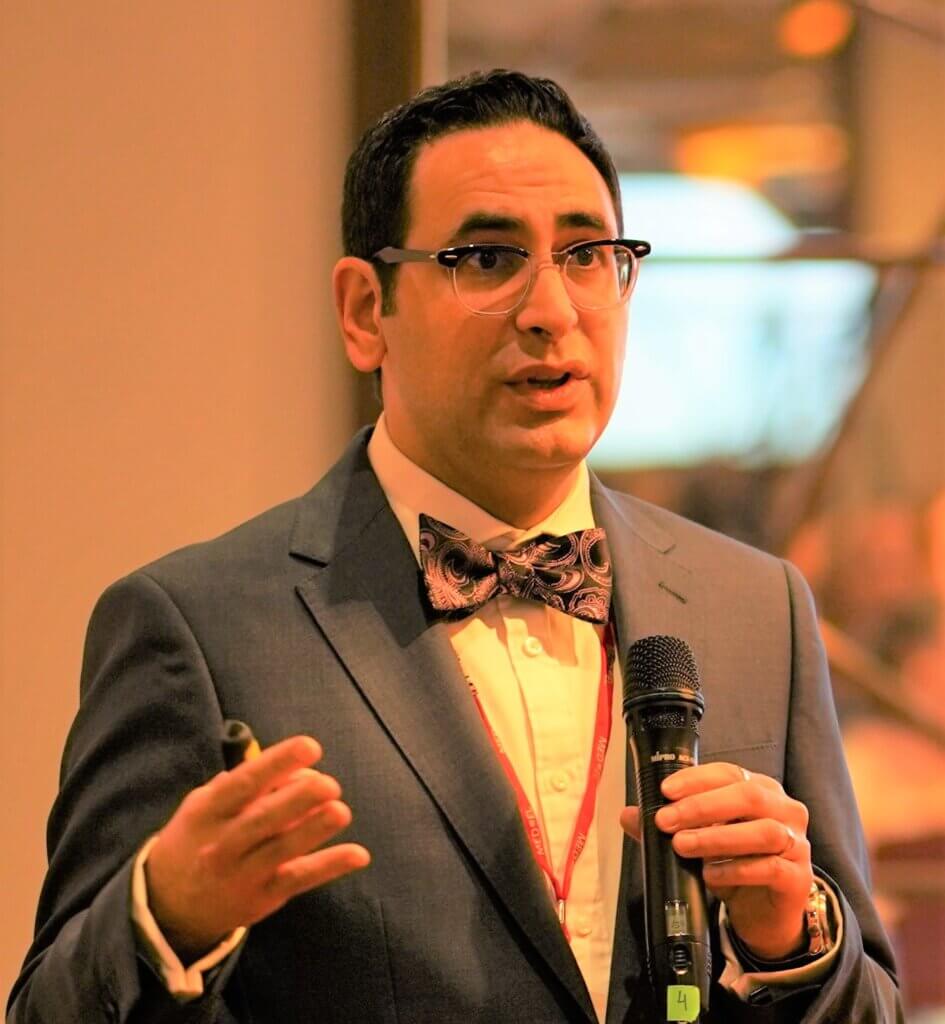
The XXXV World Congress of Audiology took place in Warsaw, Poland, on 10-13 April 2022.
Thousands of audiologists from across the globe attended this landmark event which was organised by the International Society of Audiology, World Hearing Centre and the Institute of Sensory Organs. Prof. Henryk Skarżyński, MD, PhD, dr h.c. (mult.) and Prof. Piotr H. Skarżyński, MD, PhD, MSc. were the president and scientific secretary of the congress.
In this congress, Dr Hashir Aazh presented (1) a keynote speech on tinnitus and insomnia, (2) workshop of hyperacusis assessment, and (3) a panel discussion on Hyperacusis & Tinnitus Management: Research Evidence Informing Best Practice.
Keynote speech:
The impact of tinnitus on sleep and how this can be managed with audiologist-delivered Cognitive Behavioural Therapy?
Background and objectives:
Tinnitus is the perception of sound without any sound source. Approximately, 70% of patients seeking help for tinnitus present with symptoms of insomnia. It is not clear whether the degree of insomnia is directly related to the loudness of tinnitus or to its psychological impact on the sufferer. If the latter, then the application of cognitive behavioural therapy (CBT), which aims to address the psychosocial impact of tinnitus, should improve tinnitus-related sleep disturbances. This study had two phases. The first phase aimed to assess the relationship between the loudness of tinnitus and sleep disturbances using a mediation analysis. The second phase aimed to (1) evaluate the improvements in quality of sleep after audiologist-delivered CBT, and (2) to assess the perspectives of patients about different aspects of CBT.
Materials:
Assessment procedures:
Audiological measures were the Audiometry and Uncomfortable Loudness Levels. Questionnaires administered comprised: Visual Analogue Scale (VAS) for tinnitus loudness, and tinnitus annoyance, Tinnitus Handicap Inventory (THI), Insomnia Severity Index (ISI), Generalized Anxiety Disorder (GAD-7), and Patient Health Questionnaire (PHQ-9).
Treatment procedures:
Audiologist-delivered CBT is broadly similar to CBT delivered by psychologists and includes: (1) Empathic listening informed by the client-centred counselling method; (2) Developing a case formulation that provides an explanation of the mechanism by which tinnitus leads to distress, based on cognitive theory; (3) Application of behavioural experiments to explore and modify negative thoughts and safety seeking behaviours; (4) Keeping of a Diary of Thoughts and Feelings to provide a structured method for the patient to take notes about their tinnitus problems, and their associated thoughts and emotions.
Method:
This was a two-phase retrospective cross-sectional study. In phase one, the data for 417 consecutive patients seeking treatment for tinnitus in an Audiology Department in the UK were analysed. To explore the mechanisms underlying the relationship between tinnitus loudness and ISI score, variables that significantly predicted insomnia in the stepwise multiple-regression model were included in a mediation analysis. In phase two, the data for 40 consecutive adult patients who received a full course of audiologist-delivered CBT for tinnitus management were included. As a part of their routine care, all patients completed a wide range of questionnaires before and after receiving audiologist-delivered CBT. Pre and post treatment scores on ISI were compared in order to calculate its effect size.
Results:
Phase 1: Mediation analysis showed that the relationship between tinnitus loudness and insomnia was fully mediated via depression b= 0.53 (95% confidence interval, CI: 0.35 to 0.71), tinnitus handicap b= 0.38 (95% CI: 0.16 to 0.6), and tinnitus annoyance b= 0.33 (95% CI: 0.004 to 0.66).
Phase 2: The majority of patients reported that it was very acceptable to them to receive CBT focused on tinnitus from a specialist audiologist. The majority of patients felt that the CBT was very effective and that they were able to manage their tinnitus well. The effect size of treatment based on pre-and post-intervention comparison of scores for the ISI was 0.92 (95% CI: 0.38 to 1.5).
Conclusions: Insomnia is not directly related to tinnitus loudness. Depression, tinnitus handicap and tinnitus annoyance mediate the relationship between tinnitus loudness and insomnia. Audiologist-delivered CBT is acceptable to patients and is effective in the management of tinnitus-related insomnia symptoms from the patients’ perspectives.
Workshop on 10th April 2022
Assessment of Hyperacusis: Audiological & Psychometric Evaluations complemented by In-depth Clinical Interviewing.
By the end of this workshop participants will be able to take a clinical case history for their hyperacusis patients. They will be able to modify the procedure for pure-tone audiometry and uncomfortable loudness levels tests in patients with tinnitus and/or hyperacusis in order to avoid the experience of discomfort during testing. The clinical application of a wide range of self-report questionnaires in assessment of hyperacusis and sound sensitivity will be reviewed. In addition, by the end of this session, participants should be able to select and apply a wide range of specialist self-report tools for screening of underlying panic disorder, phobia, obsessive compulsive disorder, generalised anxiety, suicidal ideations, health anxiety and depression and make appropriate onward referral to mental health services for further investigations and treatment.
Panel discussion on 11th April 2022 11:50 am to 13:20 pm
Hyperacusis & Tinnitus Management: Research Evidence Informing Best Practice
In this panel discussion, some of the key management strategies for tinnitus and hyperacusis and their evidence-base will be reviewed. Advantages and shortcomings of each approach will be discussed. Participants will have plenty of opportunity to ask their questions from the panel members.
Chairman: Hashir Aazh
Panel members
James W. Hall III: Contribution of Diagnostic Auditory Findings to Decisions About Evidence Based Management of Tinnitus and Hyperacusis
Danuta Raj-Koziak:Transcutaneous Neuromodulation by Vagus Nerve Stimulation: Research Evidence Informing Best Practice
Hannah Keppler: Hearing Aids for Tinnitus: Research Evidence Informing Best Practice
Hashir Aazh: Audiologist-delivered Cognitive Behavioural Therapy (CBT) for Tinnitus and Hyperacusis: Research Evidence Informing Best Practice